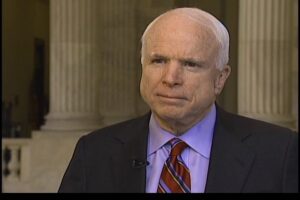WASHINGTON: When President Obama released his new National Security Strategy last week, there was great gnashing of teeth from the GOP over one particular concept mentioned once in the strategy’s 29 pages: strategic patience.
Sen. John McCain’s wingman, Lindsey Graham, launched the first strike with a tweet:
I doubt ISIL, the Iranian mullahs, or Vladimir Putin will be intimidated by President Obama’s strategy of ‘Strategic Patience.’ Lindsey Graham
Many Capitol Hill Republicans piled on during the next few days, but none offered an alternative strategy.
The strategy offered by the White House is mostly pablum. While sweeping generalities are not uncommon in such public documents, this one really just restates most of the Obama’s current policies and recasts them in the form of what they are calling a strategy. Since strategy is the application of power in all its forms — moral, economic, diplomatic and military — to achieve a country’s goals, it also requires the expression of choices. And this document makes few choices. It does commit America to a rules-based international order, but that’s what we’ve already got. Perhaps the most important commitment is to our allies. This is not new either, but it stands as something of a rebuke to the last administration, which believed America could act alone when necessary, though it took comfort in those allies who stood by our side.
One of the cannier grand strategists in America, Steven Metz at the Army War College, dismissed the Obama strategy outright as “a stump speech.”
“It’s not a strategy in any normal sense of the word. There’s no vision, no short- or long-term objectives, no priorities, no sense of acceptable means,” Metz said in an email.
Back to the term strategic patience. The term isn’t even a formal part of the strategy itself. It is found in the president’s introduction to the strategy.
But strategic patience — that much maligned phrase — is actually the one concept mentioned in the strategy that Metz has time for.
The mockery of the term by Graham and many others “shows the malignancy of political discourse in America,” says Metz. Indeed, he believes the term is “absolutely accurate and absolutely valid.”
Here’s what’s said in the president’s introduction:
“As powerful as we are and will remain, our resources and influence are not infinite. And in a complex world, many of the security problems we face do not lend themselves to quick and easy fixes. The United States will always defend our interests and uphold our commitments to allies and partners. But, we have to make hard choices among many competing priorities, and we must always resist the over-reach that comes when we make decisions based upon fear. Moreover, we must recognize that a smart national security strategy does not rely solely on military power. Indeed, in the long-term, our efforts to work with other countries to counter the ideology and root causes of violent extremism will be more important than our capacity to remove terrorists from the battlefield.”
“The challenges we face require strategic patience and persistence. They require us to take our responsibilities seriously and make the smart investments in the foundations of our national power.”
Making choices about what one should and should not do, with an eye on the long game and one’s goals, is the essence of strategy. And that requires strategic patience and persistence. For those who would mock this, remember the Cold War.
As Sen. McCain himself put it in Munich last week: “In time, our vision of world order succeeded and spread—not just in Europe, which became increasingly whole, free, and at peace; but also across Asia, the Americas, and beyond. This was not preordained. It did not happen, with respect to [Russian Foreign] Minister Lavrov, because of Russia’s efforts to unify Germany. We succeeded, to be sure, because of the inherent appeal of our values, and the material gains they foster, and the inspiration of our example. But ultimately, we succeeded because free societies marshaled our power, both soft and hard power, to sustain and defend our Liberal world order.”
Pass a preemptive CR, deal with inflation and watch the debt limit: 3 tasks for Congress
John Ferrari and Elaine McCusker of AEI argue in this op-ed that Congress needs to act quickly to ensure American national security before getting bogged down in election season.




























